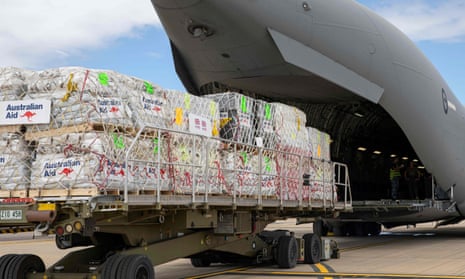The huge Aukus price tag has sparked calls to boost aid funding, with the sector lobbying the Australian government not to dismiss such measures as an optional “luxury”.
The nuclear-powered submarine program is forecast to cost between $268bn and $368bn by the mid 2050s, most of it beyond the first four-year budget period.
Humanitarian and development organisations have pointed to this allocation as proof that “significant funds” are available if the government shows political will.
In meetings with MPs from across the political spectrum in Canberra, the sector has stressed that Australia spends just $1 on aid for every $10 spent on defence.
The Australian Council for International Development argues security is more likely to be assured when the different arms of statecraft – defence, diplomacy and development – are working together.
It has noted that Australia remains near the bottom of the OECD ladder for foreign aid funding as a share of gross national income.
Its member organisations, including ChildFund and UnitingWorld, are calling for “a balance of approaches” after the Aukus announcement.
Margaret Sheehan, the chief executive of ChildFund, said: “Clearly, there are funds that are available and I suppose it’s about the way people choose to prioritise those funds.”
Sign up for Guardian Australia’s free morning and afternoon email newsletters for your daily news roundup
Sheehan said defence, diplomacy and development were interconnected. “We want to see a fair weighting – and Australians would say a fair go.”
Sureka Goringe, the national director at UnitingWorld, said: “Development has a proven track record in making friends and influencing people, so we should use it.
“This is not a ‘nice to have’ luxury. This is a core strategic investment for Australia.”
The sector is asking the government to commit to a clear timetable for meeting a pledge to restore official development assistance to 0.5% of gross national income.
To deal with more immediate crises, such as natural disasters and famine in the region and beyond, the sector also wants the government to double the $150m annual humanitarian emergency fund.
“We’re seeing that the need is escalating through the impacts of Covid, the impact of conflict, particularly the war in Ukraine, and obviously, the climate crisis, which has no borders,” Goringe said.
Faysel Ahmed Selat, the president of the Somali Community Association of Queensland, travelled to Canberra to support the Help Fight Famine campaign, which seeks a $110m famine prevention package focused on the Horn of Africa, Yemen, Afghanistan and Syria.
“What I can tell you is the Somali community in Australia … are going without and sending money to family members who would otherwise have nothing,” he told Guardian Australia.
after newsletter promotion
“We are suffering because of the loss of family members, grandparents, children, mothers, fathers, or we may be worried about their wellbeing.”
Pat Conroy, the minister for international development, defence industry and the Pacific, has sought to assure the sector that the government is not focused only on hard power.
Conroy said the government was “serious about putting development at the centre of how we do international engagement”.
“When I talk to the leaders of the Department of Defence, they’re evangelical that hard power – acquiring nuclear submarines – has to be complemented with equal efforts on soft power, investing in diplomacy, investing in development,” he said.
Conroy said members of the cabinet’s national security committee accepted that Australia faced “the greatest strategic uncertainty since 1945” and this compelled the government to invest in all elements of statecraft.
He said that attitude was a big reason he and the foreign affairs minister, Penny Wong, had secured “so much support” internally to increase development funding by $1.4bn over four years in the Albanese government’s first budget.
Conroy said the government would “always look at opportunities to make sure that money is spent well and, where there are opportunities, to increase it”, but he added a word of caution about the budget.
“We’re in a very tight fiscal environment at the moment, and we need to balance all those demands.”
The increase to development funding announced last October came on top of a low base because of multibillion-dollar cuts made during the Coalition’s time in office.
In 2021 Australia was ranked 21st out of 29 OECD donors for development assistance, delivering 0.22% of gross national income.
